Written By: Hell³
 One release that got badly overlooked in 2014 was the debut of Portland’s Nightfell. Buried below the avalanche of notable productions that got out after its release on early February, few dug it out at the end of the year to give it a place on their lists. As a brooding piece of lightly D-beat infused Doom/Death, it’s a cunning mix of the lengthy musical background of both members. Back after little more than a year, they switched labels going from Southern Lord to 20 Buck Spin and just unloaded another crushing shipping container filled with engaging riffs and melodies named Darkness Evermore.
One release that got badly overlooked in 2014 was the debut of Portland’s Nightfell. Buried below the avalanche of notable productions that got out after its release on early February, few dug it out at the end of the year to give it a place on their lists. As a brooding piece of lightly D-beat infused Doom/Death, it’s a cunning mix of the lengthy musical background of both members. Back after little more than a year, they switched labels going from Southern Lord to 20 Buck Spin and just unloaded another crushing shipping container filled with engaging riffs and melodies named Darkness Evermore.
The drum kit is the domain of Tim Call, who has been part of notable Profound Lore bands Aldebaran and The Howling Wind, among others. With the former being a funeral doom staple, and the latter deeply entrenched into black metal chasms, his work would hardly ever be classified as one-dimensional or flat. Tom Burdette, responsible for the guitar and bass on Nightfell, has equally impressive credentials. He’s known for hardcore acts Tragedy, Warcry, and the short-lived but highly influential crust band His Hero is Gone. By now you’re probably rolling your eyes at the thought of yet another obscure sludge band wasting the time you’d better use replaying Repentless. But to pigeonhole this band is a huge mistake.
Now, track-by-track reviews are highly frowned upon here, but with only six songs constituting 42 minutes of music, with four of those minutes being a couple of interludes, it’s hard not to rave about the four remaining songs and their remarkable quality. Opener “At last” throws a bit of a curveball making the listener think they may be headed into lead-lined doom territory, building over a mournful guitar melody backed by cello, reminiscent of Pallbearer’s output. But then the throaty growl of Burdette and meaty guitar tone show lush progressive death riffing in a late-Morbus Chron style. The protracted song lengths may cause some apprehension, but the rhythmic and melodic structures are constantly shaken up by Call and Burdette. You get Mayhem-like tremulous guitars and galloping beats mixed around the solid riffing and engaging hooks that also have a strong melo-death feel on the fantastic “Cleansing.” Call doesn’t pull punches and mingles D-beats with blast-beats on “Rebirth,” while Burdette breaks it in half with an atmospheric build-up so dense it could make any Cascadian band from their native Portland blush. Closer “Collapse” provides another twist to the formula by having a Celtic, Primordial tint, with martial beat included, once again showcasing the duo’s great songwriting abilities.

There are very few nitpicks with Darkness Evermore. One would be the length. I support the idea of leaving the listener wanting for more, but without the interludes this release is barely above EP length. If the interludes were developed into proper songs it would be way more satisfying. Still, the overall record manages to set up an arching plot that can be inferred by looking at the track titles, without ever falling into concept album trappings. The second nitpick would be the production. It’s a clear step above their debut with the mix more balanced and punchy, but it’s still mastered a bit loud. That said, it’s still quite enjoyable and not very fatiguing, ensuring a lot of replay value. It definitely makes one hope the upcoming vinyl release features a more dynamic mastering.
Even if you’re not familiar with Nightfell’s previous work or the duo’s other projects, Darkness Evermore is more than enough to send you scrambling for more music from this gruesome twosome. This is one of the more notable blackened death/doom releases of the year, as narrow as that scope may be, and I encourage you to check out last year’s The Living Ever Mourn if you haven’t already.
Rating: 4.5/5.0
DR: 8 | Format Reviewed: 320 kbps MP3
Label: 20 Buck Spin
Websites: Nightfell.bandcamp.com
Releases Worldwide: September 11th, 2015
The post Nightfell – Darkness Evermore Review appeared first on Angry Metal Guy.

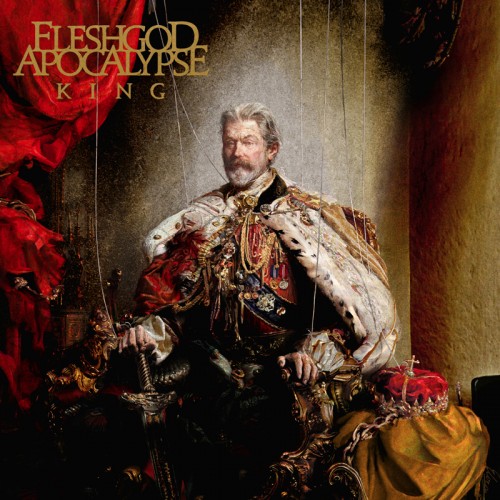 Fleshgod Apocalypse is well known in these parts for having produced a debut album that I worship and two albums since then that I don’t. Back in aught nine, the band released
Fleshgod Apocalypse is well known in these parts for having produced a debut album that I worship and two albums since then that I don’t. Back in aught nine, the band released 
 Brutality came along at the first death knell of a genre that has outlasted just about every musical trend that has come and gone. They released some thrashy death metal demos, one of which (Dimension Demented) I reviewed in the print version of Unchain the Underground back in 1992. They shed any sense of frivolity on their 1993 debut (which
Brutality came along at the first death knell of a genre that has outlasted just about every musical trend that has come and gone. They released some thrashy death metal demos, one of which (Dimension Demented) I reviewed in the print version of Unchain the Underground back in 1992. They shed any sense of frivolity on their 1993 debut (which 

 Crack a beer and get comfy folks, it’s storytime. Our tale is about a brave group of Swedes who decided to storm the castle of greatness, knowing full well the dangers and hardships they’d face. The lofty standards of age-old records loved worldwide would need to be breached. Our protagonists would need to deftly maneuver within clear and defined stylistic boundaries. These Swedes go by the name Hyperion, and the tome of their triumph is called Seraphical Euphony.
Crack a beer and get comfy folks, it’s storytime. Our tale is about a brave group of Swedes who decided to storm the castle of greatness, knowing full well the dangers and hardships they’d face. The lofty standards of age-old records loved worldwide would need to be breached. Our protagonists would need to deftly maneuver within clear and defined stylistic boundaries. These Swedes go by the name Hyperion, and the tome of their triumph is called Seraphical Euphony.
 diSEMBOWELMENT left quite a mark with their one-and-only album, 1993’s brilliant Transcendence into the Peripheral, before disbanding later that year. In the ensuing decades since, many doom/death hybrids have come and gone and few have come close to attaining the lofty heights ascended by the sadly-missed Australians. So, when bassist (now guitarist) Matthew Skarajew and drummer Paul Mazziotta would regroup as d.USK in 2011 playing the old classics with new members, I was excited to check out a band that I missed after they had called it a day. However, after renaming themselves Inverloch later that year with a promise of new material, I approached the concept with extreme caution. Thankfully, their 2012 EP, Dusk | Subside, was a short-but-fully-effective taste of what the band is capable of, and now we have their debut full-length, Distance | Collapsed.
diSEMBOWELMENT left quite a mark with their one-and-only album, 1993’s brilliant Transcendence into the Peripheral, before disbanding later that year. In the ensuing decades since, many doom/death hybrids have come and gone and few have come close to attaining the lofty heights ascended by the sadly-missed Australians. So, when bassist (now guitarist) Matthew Skarajew and drummer Paul Mazziotta would regroup as d.USK in 2011 playing the old classics with new members, I was excited to check out a band that I missed after they had called it a day. However, after renaming themselves Inverloch later that year with a promise of new material, I approached the concept with extreme caution. Thankfully, their 2012 EP, Dusk | Subside, was a short-but-fully-effective taste of what the band is capable of, and now we have their debut full-length, Distance | Collapsed.
 Being old means you keep a lot of crap and not just what’s clogging your colon. I still have the issue of Unchain the Underground (as referenced in my
Being old means you keep a lot of crap and not just what’s clogging your colon. I still have the issue of Unchain the Underground (as referenced in my 
 You’ve witnessed the scene. It’s a part of the furniture in many contemporary neo-neo-noir, ominously foreboding, condemningly pseudofuturist movies. Our heroic but morally ambiguous protagonist visits some sort of underground nightclub. People, presumably the filth of the city, dance spastically (yet provocatively) under stroboscopes, adorned by black leather and fetishized clothing. A mixture of disgust and temptation lingers while a red haze surrounds the entangled mess of bodies. It’s Hollywood’s typical portrayal of Hell on Earth, a mise-en-scène imbued with cheap symbolism. Imagine now a worthy metal accompaniment to such a spectacle in real life, deprived of all the fabricated fanciness, something that would eclipse phony visual cues and provide a truly infernal setting. Forget about the usual sonic backdrop featuring, at best, Marilyn Manson or Nine Inch Nails or, at worst, someone’s archaic idea of Detroit techno. Imagine instead, music so punishing and absurd that it makes you stagger while it replaces even the most resilient, essential hopes with an awareness of the inevitability and existential dread of a genuine Hell. Do you have it in your mind? Well, then you can feel how Alex Poole’s (Krieg, Esoterica, Chaos Moon) and D.G.’s (Misþyrming, Naðra) project Skáphe sounds. Skáphe², you see, is an unapologetically extreme attack on the senses and a source of ruthless, grueling emotional overload. And it’s beautiful.
You’ve witnessed the scene. It’s a part of the furniture in many contemporary neo-neo-noir, ominously foreboding, condemningly pseudofuturist movies. Our heroic but morally ambiguous protagonist visits some sort of underground nightclub. People, presumably the filth of the city, dance spastically (yet provocatively) under stroboscopes, adorned by black leather and fetishized clothing. A mixture of disgust and temptation lingers while a red haze surrounds the entangled mess of bodies. It’s Hollywood’s typical portrayal of Hell on Earth, a mise-en-scène imbued with cheap symbolism. Imagine now a worthy metal accompaniment to such a spectacle in real life, deprived of all the fabricated fanciness, something that would eclipse phony visual cues and provide a truly infernal setting. Forget about the usual sonic backdrop featuring, at best, Marilyn Manson or Nine Inch Nails or, at worst, someone’s archaic idea of Detroit techno. Imagine instead, music so punishing and absurd that it makes you stagger while it replaces even the most resilient, essential hopes with an awareness of the inevitability and existential dread of a genuine Hell. Do you have it in your mind? Well, then you can feel how Alex Poole’s (Krieg, Esoterica, Chaos Moon) and D.G.’s (Misþyrming, Naðra) project Skáphe sounds. Skáphe², you see, is an unapologetically extreme attack on the senses and a source of ruthless, grueling emotional overload. And it’s beautiful.
 SIG:AR:TYR are one of the most criminally overlooked acts in the Viking/folk/black metal arena and even after three high quality albums they still seem woefully under-appreciated. Taking the best elements of Bathory’s Viking era and fusing them with influences ranging from Immortal, Falkenbach and Primordial, founder and sole member Daemonskald crafted some amazingly epical moments on unsung classics like Beyond the North Winds and 2010’s Godsaga. After a long period of hibernation and transformation, SIG:AR:TYR now re-emerge as a full-fledged band for their new treatise on all things Viking, Northen. Clocking in at over an hour, Northen is a massive saga detailing the 10th century Viking exploration of modern day Canada as the Viking age itself was drawing to a close. Imagine what Bathory could have done with Hammerheart or Twilight of the Gods if he had a talented band and vastly superior recording technology and you get an idea of what to expect here – huge odes to the ways of the Norsemen full of thunderous riffage, glorious bombast and more heroics than 10 Avengers movies. Most importantly, you get songwriting chops capable of turning these elements into something truly special. One thing’s for certain: if you aren’t strong enough to swing a war hammer now, you will be after one spin of this platter of raw Odin-meal.
SIG:AR:TYR are one of the most criminally overlooked acts in the Viking/folk/black metal arena and even after three high quality albums they still seem woefully under-appreciated. Taking the best elements of Bathory’s Viking era and fusing them with influences ranging from Immortal, Falkenbach and Primordial, founder and sole member Daemonskald crafted some amazingly epical moments on unsung classics like Beyond the North Winds and 2010’s Godsaga. After a long period of hibernation and transformation, SIG:AR:TYR now re-emerge as a full-fledged band for their new treatise on all things Viking, Northen. Clocking in at over an hour, Northen is a massive saga detailing the 10th century Viking exploration of modern day Canada as the Viking age itself was drawing to a close. Imagine what Bathory could have done with Hammerheart or Twilight of the Gods if he had a talented band and vastly superior recording technology and you get an idea of what to expect here – huge odes to the ways of the Norsemen full of thunderous riffage, glorious bombast and more heroics than 10 Avengers movies. Most importantly, you get songwriting chops capable of turning these elements into something truly special. One thing’s for certain: if you aren’t strong enough to swing a war hammer now, you will be after one spin of this platter of raw Odin-meal.
 German duo Mantar stormed the underground, cracking skulls and galloping to glory with their scorching debut album, Death by Burning in 2014. Fusing raucous black metal with spiteful sludge and doomy slogs, Mantar’s punked-up energy, fuck-the-world attitude and an abundance of primal riffs and gnarly hooks kept me gripped and hungry for more. On the back of the album Mantar deservedly scored a deal with Nuclear Blast for the anticipated release of the all important sophomore album. So with the
German duo Mantar stormed the underground, cracking skulls and galloping to glory with their scorching debut album, Death by Burning in 2014. Fusing raucous black metal with spiteful sludge and doomy slogs, Mantar’s punked-up energy, fuck-the-world attitude and an abundance of primal riffs and gnarly hooks kept me gripped and hungry for more. On the back of the album Mantar deservedly scored a deal with Nuclear Blast for the anticipated release of the all important sophomore album. So with the 
 Plebeian Grandstand is a name destined for immortality. Over the course of two albums – 2011’s How Hate is Hard to Define and 2014’s Lowgazers, the Tolousian group have annihilated any doubt as to their supremacy in extremity. How Hate is Hard to Define‘s distillation of noise, black metal and mathcore proved their worth as ‘the angriest band on the planet,’ but the sheer ambition of Lowgazers propelled the group somewhere further; the conspicuous revolver adorning Hate now pointed not at the temple, but away from the body. Pulling away from the hardcore aspects of the debut, Lowgazers was more blackened, brutal and unapproachable, but less volatile as well. False Highs, True Lows departs even further, a continuously difficult album from a continuously mobile band.
Plebeian Grandstand is a name destined for immortality. Over the course of two albums – 2011’s How Hate is Hard to Define and 2014’s Lowgazers, the Tolousian group have annihilated any doubt as to their supremacy in extremity. How Hate is Hard to Define‘s distillation of noise, black metal and mathcore proved their worth as ‘the angriest band on the planet,’ but the sheer ambition of Lowgazers propelled the group somewhere further; the conspicuous revolver adorning Hate now pointed not at the temple, but away from the body. Pulling away from the hardcore aspects of the debut, Lowgazers was more blackened, brutal and unapproachable, but less volatile as well. False Highs, True Lows departs even further, a continuously difficult album from a continuously mobile band.
 Sometimes a band comes out of nowhere and takes a baseball bat to the established way of doing things. Whether that means adding banjos to black metal or incorporating 70s prog into doom/death, it can result in absolute triumph or a total grease fire. It’s those unexpected triumphs in particular that make music such a visceral and exciting medium and when a band pulls off something new and unusual, they deserve respect and admiration. Unknown Italian doomsters Messa want to be the next trend wrecker and to that end they’ve fused dark ambient weirdness and minimalist drone onto old school doom on their eye-opening debut, Belfry. And what an end! Calling their unorthodox style “Scarlet Doom,” they challenge listener’s expectations throughout the album’s 58 minute run time, and while their eccentric usage of drone and classic doom confused and baffled me at first, now I’m hard pressed to stop spinning it and soon I suspect I won’t be alone.
Sometimes a band comes out of nowhere and takes a baseball bat to the established way of doing things. Whether that means adding banjos to black metal or incorporating 70s prog into doom/death, it can result in absolute triumph or a total grease fire. It’s those unexpected triumphs in particular that make music such a visceral and exciting medium and when a band pulls off something new and unusual, they deserve respect and admiration. Unknown Italian doomsters Messa want to be the next trend wrecker and to that end they’ve fused dark ambient weirdness and minimalist drone onto old school doom on their eye-opening debut, Belfry. And what an end! Calling their unorthodox style “Scarlet Doom,” they challenge listener’s expectations throughout the album’s 58 minute run time, and while their eccentric usage of drone and classic doom confused and baffled me at first, now I’m hard pressed to stop spinning it and soon I suspect I won’t be alone.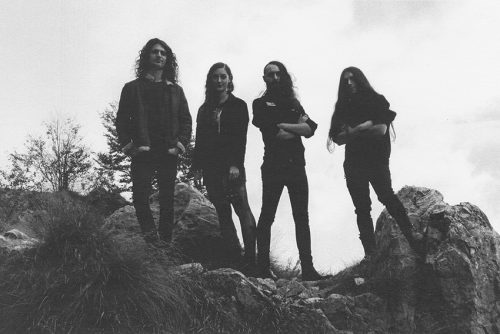
 From a performance perspective, this is a total team win. Sara’s vocals are amazing and embody the best aspects of Jex Thoth, Dorthia Cottrell (Windhand), Jennie Ann Smith (Avatarium) and Jamie Meyers (Sabbath Assembly). She has a more raw, unpolished style, but it works amazingly well. Alberto and Mark Sade craft some first-rate doom riffs and take their playing into many realms of weirdness along the way (the solo on “New Horns” is an LSD-drenched revelation). What’s most impressive is how memorable much of their playing is and how strongly it locks the listener in. I also appreciate the drumming of Mistyr. The man pounds those skins like a Manowar drummer, but maintains an unusual subtlety as well. The whole band is on point throughout Belfry leaving me with very little to complain about.
From a performance perspective, this is a total team win. Sara’s vocals are amazing and embody the best aspects of Jex Thoth, Dorthia Cottrell (Windhand), Jennie Ann Smith (Avatarium) and Jamie Meyers (Sabbath Assembly). She has a more raw, unpolished style, but it works amazingly well. Alberto and Mark Sade craft some first-rate doom riffs and take their playing into many realms of weirdness along the way (the solo on “New Horns” is an LSD-drenched revelation). What’s most impressive is how memorable much of their playing is and how strongly it locks the listener in. I also appreciate the drumming of Mistyr. The man pounds those skins like a Manowar drummer, but maintains an unusual subtlety as well. The whole band is on point throughout Belfry leaving me with very little to complain about.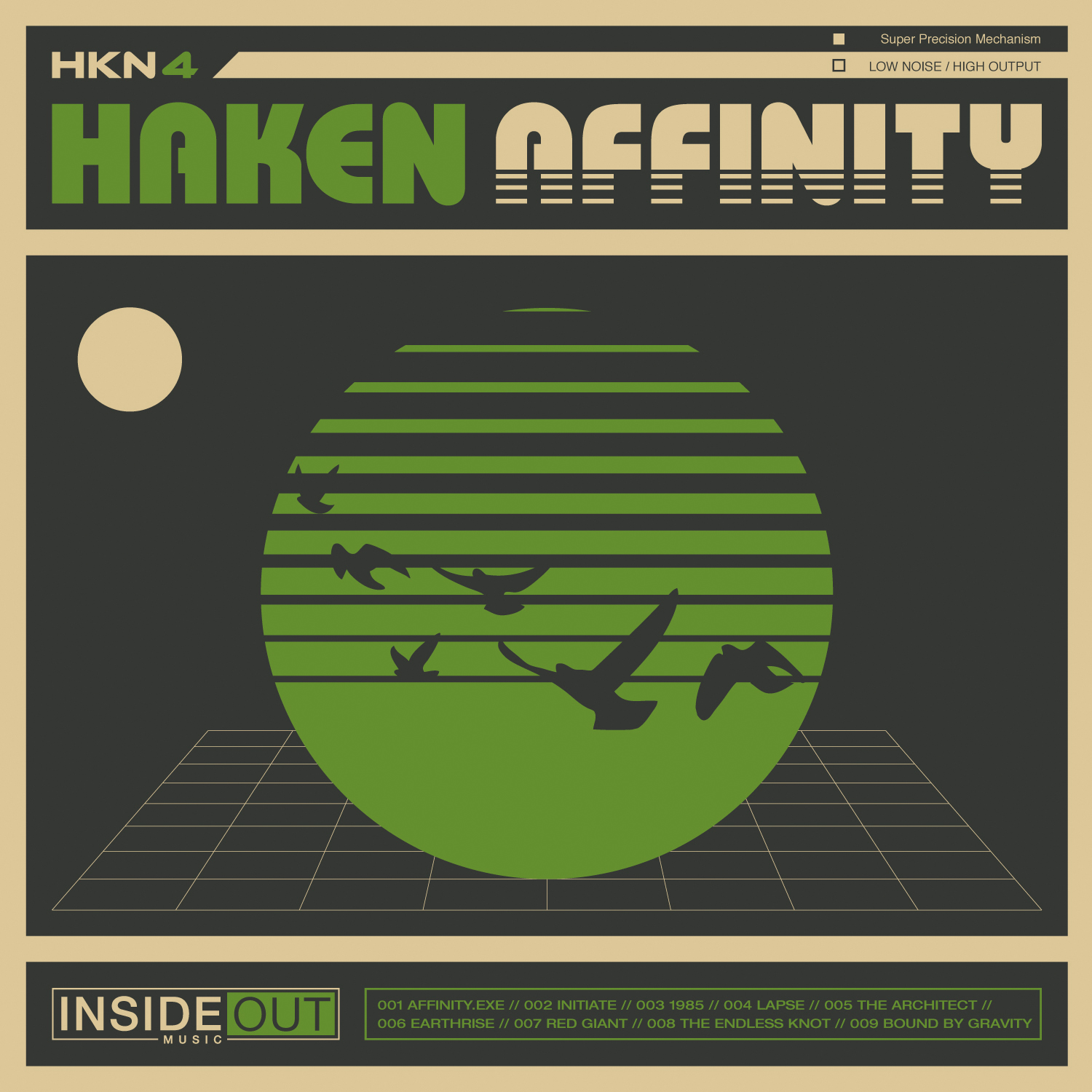 Haken have rapidly become one of my favorite bands in the world. Since my introduction with 2013’s
Haken have rapidly become one of my favorite bands in the world. Since my introduction with 2013’s 
 In 2014, Finnish three-headed beast Vainaja dropped a megaton bomb in the form of
In 2014, Finnish three-headed beast Vainaja dropped a megaton bomb in the form of 
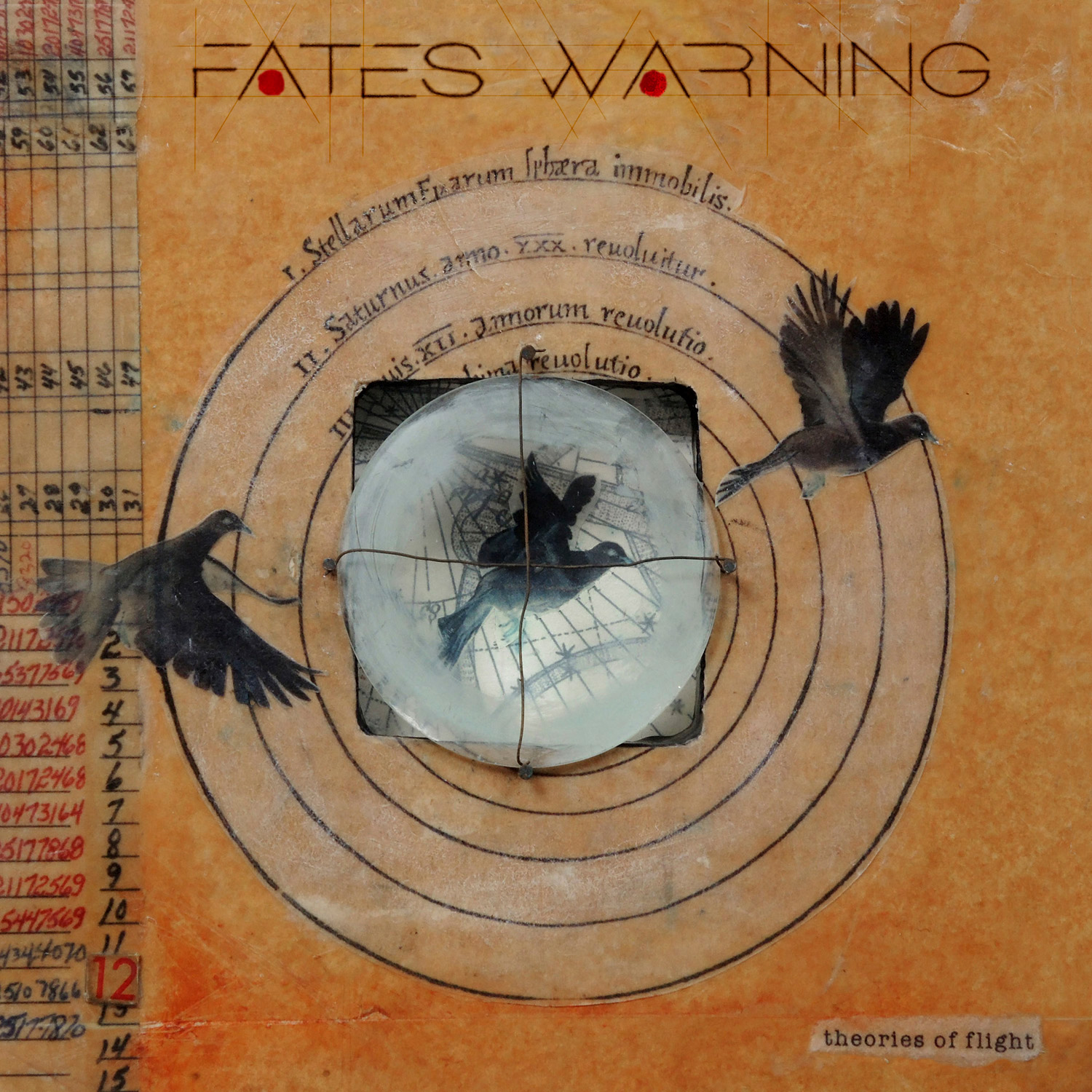 Circumstances have not been kind to prog-metal forefathers Fates Warning. For most of the past decade and a half, the band has been sidelined while far lesser acts have laid claim to the entire genre (oh hi, Dream Theater). The fact that Fates have released some incredibly inaccessible albums has not helped their cause, nor did their 9-year hiatus from making new music altogether. 2013’s comeback Darkness In A Different Light was a heavy, catchy and focused record, and it seemed like Fates Warning was finally back on track. The quick (by FW standards) turnaround for Theories Of Flight seems to bode well, but can the band maintain the high standards they’ve reestablished?
Circumstances have not been kind to prog-metal forefathers Fates Warning. For most of the past decade and a half, the band has been sidelined while far lesser acts have laid claim to the entire genre (oh hi, Dream Theater). The fact that Fates have released some incredibly inaccessible albums has not helped their cause, nor did their 9-year hiatus from making new music altogether. 2013’s comeback Darkness In A Different Light was a heavy, catchy and focused record, and it seemed like Fates Warning was finally back on track. The quick (by FW standards) turnaround for Theories Of Flight seems to bode well, but can the band maintain the high standards they’ve reestablished?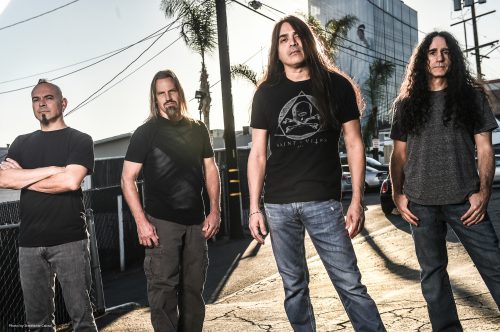
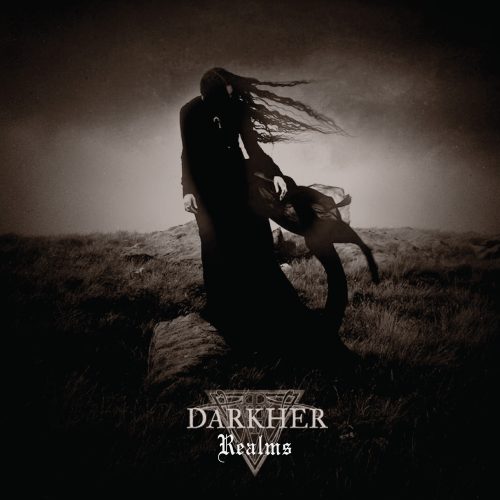 When you think about the month of August, what does your mind conjure up? Afternoon swims in your background pool? Grilling your favorite killed prey on the barbecue with an ice-cold beer clutched in one hand? Unbearably hot heat waves? Whatever it is, I’m sure you are not thinking of one-person doom metal, and yet I am seemingly bombarded with just that this year. Earlier this month, Spirit Adrift impressed me with their (err, his)
When you think about the month of August, what does your mind conjure up? Afternoon swims in your background pool? Grilling your favorite killed prey on the barbecue with an ice-cold beer clutched in one hand? Unbearably hot heat waves? Whatever it is, I’m sure you are not thinking of one-person doom metal, and yet I am seemingly bombarded with just that this year. Earlier this month, Spirit Adrift impressed me with their (err, his) 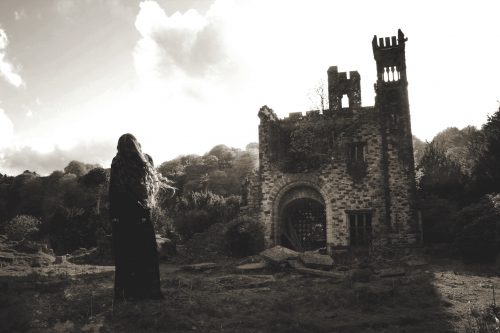
 In light of AMG’s
In light of AMG’s 
 One of my friends, a classicist and lover of classical music, has a few favorite metal bands he’s never heard. It’s not the music that makes him love Necrophagist or Abominable Putridity; it’s just the absurdity of their names, the contortions of language that must occur for brutality to surge forth. Unfathomable Ruination is a band he can get behind. And well he should, because it would be foolish to try to get ahead of them. Since their 2012 release of Misshapen Congenital Entropy, I’ve been keeping an ear out for the group’s masterful riffcraft, classy songwriting, and cromulitudinously embiggenified lyrical constructions. Taking pointers from Suffocation, Death, Origin and Ulcerate, the band’s sound is unfuckwithable as they come, built from the basics of death metal; guttural howls, blast beats, and an almighty storm of riffs.
One of my friends, a classicist and lover of classical music, has a few favorite metal bands he’s never heard. It’s not the music that makes him love Necrophagist or Abominable Putridity; it’s just the absurdity of their names, the contortions of language that must occur for brutality to surge forth. Unfathomable Ruination is a band he can get behind. And well he should, because it would be foolish to try to get ahead of them. Since their 2012 release of Misshapen Congenital Entropy, I’ve been keeping an ear out for the group’s masterful riffcraft, classy songwriting, and cromulitudinously embiggenified lyrical constructions. Taking pointers from Suffocation, Death, Origin and Ulcerate, the band’s sound is unfuckwithable as they come, built from the basics of death metal; guttural howls, blast beats, and an almighty storm of riffs.
 Crack a beer and grab a seat. Today’s entertainment is a double feature from two Texas-based bands with a proclivity for taking black metal and turning it on its ugly, corpse-painted head. First up is Cara Neir, an idiosyncratic, punky duo whose hardcore-tinged blackness often lends itself to wild stylistic forays, as heard on 2013’s Portals to a Better, Dead World. On the flip side is Wildspeaker, a crustier, sludgier outfit who formed in 2013 and released debut Survey the Wreckage last year. They’re here to deliver Guilt and His Reflection, 13 tracks depicting “humanity crumbling into itself” through “the story of post-civilization sins committed when desperation overwhelms.” Foreboding stuff – but is it worth the price of admission?
Crack a beer and grab a seat. Today’s entertainment is a double feature from two Texas-based bands with a proclivity for taking black metal and turning it on its ugly, corpse-painted head. First up is Cara Neir, an idiosyncratic, punky duo whose hardcore-tinged blackness often lends itself to wild stylistic forays, as heard on 2013’s Portals to a Better, Dead World. On the flip side is Wildspeaker, a crustier, sludgier outfit who formed in 2013 and released debut Survey the Wreckage last year. They’re here to deliver Guilt and His Reflection, 13 tracks depicting “humanity crumbling into itself” through “the story of post-civilization sins committed when desperation overwhelms.” Foreboding stuff – but is it worth the price of admission? Now I’ll be honest – if I’d read that last paragraph before hearing Guilt, I’d probably assume Cara’s songs were too heady and exhausting to be worth my time. Fortunately, they’re anything but. The slinky, distinct basslines are often more memorable than you’d expect, and the ricocheting tremolos are deceptively enjoyable. For how rhythmically disjointed everything seems on first pass, there’s a slick cohesiveness amongst the exotic time signatures and occasional blastbeats. Sure the snare sounds somewhat wooden and the drums are a tad quiet, but at the forefront, the guitar and bass still etch out a richly gothic, willowy atmosphere. As demonstrated by the low thumping plucks and xylophone hits of ambient finisher “Guilt,” this band has a true character in addition to their captivating music.
Now I’ll be honest – if I’d read that last paragraph before hearing Guilt, I’d probably assume Cara’s songs were too heady and exhausting to be worth my time. Fortunately, they’re anything but. The slinky, distinct basslines are often more memorable than you’d expect, and the ricocheting tremolos are deceptively enjoyable. For how rhythmically disjointed everything seems on first pass, there’s a slick cohesiveness amongst the exotic time signatures and occasional blastbeats. Sure the snare sounds somewhat wooden and the drums are a tad quiet, but at the forefront, the guitar and bass still etch out a richly gothic, willowy atmosphere. As demonstrated by the low thumping plucks and xylophone hits of ambient finisher “Guilt,” this band has a true character in addition to their captivating music.
 Khemmis sat atop my list of very pleasant surprises for 2015, with their unheralded Absolution debut being one of the best doom platters of the year and one of the
Khemmis sat atop my list of very pleasant surprises for 2015, with their unheralded Absolution debut being one of the best doom platters of the year and one of the  “
“
 There will be no encore. The hour is nigh when some lucky few will experience the last gig, the last song, the last moment of the world’s most violent performative force. And the rest will be silence – because after The Dillinger Escape Plan leave the stage, the vacuum left behind won’t fill. Few artists have ever accomplished such a monumentally intense yet far-reaching career. How many can claim to have collaborated with both Mike Patton and Jarren Benton? To have covered Justin Timberlake and be covered by string quartet Seven)Suns? After years of dizzying performances and stratospheric success, The Dillinger Escape Plan find themselves with no barrier left to break.
There will be no encore. The hour is nigh when some lucky few will experience the last gig, the last song, the last moment of the world’s most violent performative force. And the rest will be silence – because after The Dillinger Escape Plan leave the stage, the vacuum left behind won’t fill. Few artists have ever accomplished such a monumentally intense yet far-reaching career. How many can claim to have collaborated with both Mike Patton and Jarren Benton? To have covered Justin Timberlake and be covered by string quartet Seven)Suns? After years of dizzying performances and stratospheric success, The Dillinger Escape Plan find themselves with no barrier left to break. 2013’s One of Us is the Killer was many things, but I liked to sum it up in a single name: Billy Rymer. Mind-blowing performances on tracks like “When I Lost My Bet” established his absolute dominance in technical drumming, and the detail and energy of his playing made great songs into incredible songs. Yet on Dissociation Greg Puciato gets the last chance to contribute and uses it to break new ground and top even Rymer’s performance. Puciato writes and records his vocals only after the rest of the album is essentially finished, meaning that he has a unique freedom to shape songs in ways the rest of the band can’t; yet the music is tailor made for him in the first place. When the band give him addled interludes, he responds with spoken-word ennui in “Wanting Not So Much to as To.” When given space between attacks in “Manufacturing Discontent,” he fills with a yowl that’s half blues, half hardcore. His double-tracked pop-crooning is breathtaking next to Seven)Suns quartet’s strings and layered industrial polyrhythm on The Dillinger Escape Plan‘s final song, imploring; “Find me a way to die alone.”
2013’s One of Us is the Killer was many things, but I liked to sum it up in a single name: Billy Rymer. Mind-blowing performances on tracks like “When I Lost My Bet” established his absolute dominance in technical drumming, and the detail and energy of his playing made great songs into incredible songs. Yet on Dissociation Greg Puciato gets the last chance to contribute and uses it to break new ground and top even Rymer’s performance. Puciato writes and records his vocals only after the rest of the album is essentially finished, meaning that he has a unique freedom to shape songs in ways the rest of the band can’t; yet the music is tailor made for him in the first place. When the band give him addled interludes, he responds with spoken-word ennui in “Wanting Not So Much to as To.” When given space between attacks in “Manufacturing Discontent,” he fills with a yowl that’s half blues, half hardcore. His double-tracked pop-crooning is breathtaking next to Seven)Suns quartet’s strings and layered industrial polyrhythm on The Dillinger Escape Plan‘s final song, imploring; “Find me a way to die alone.”